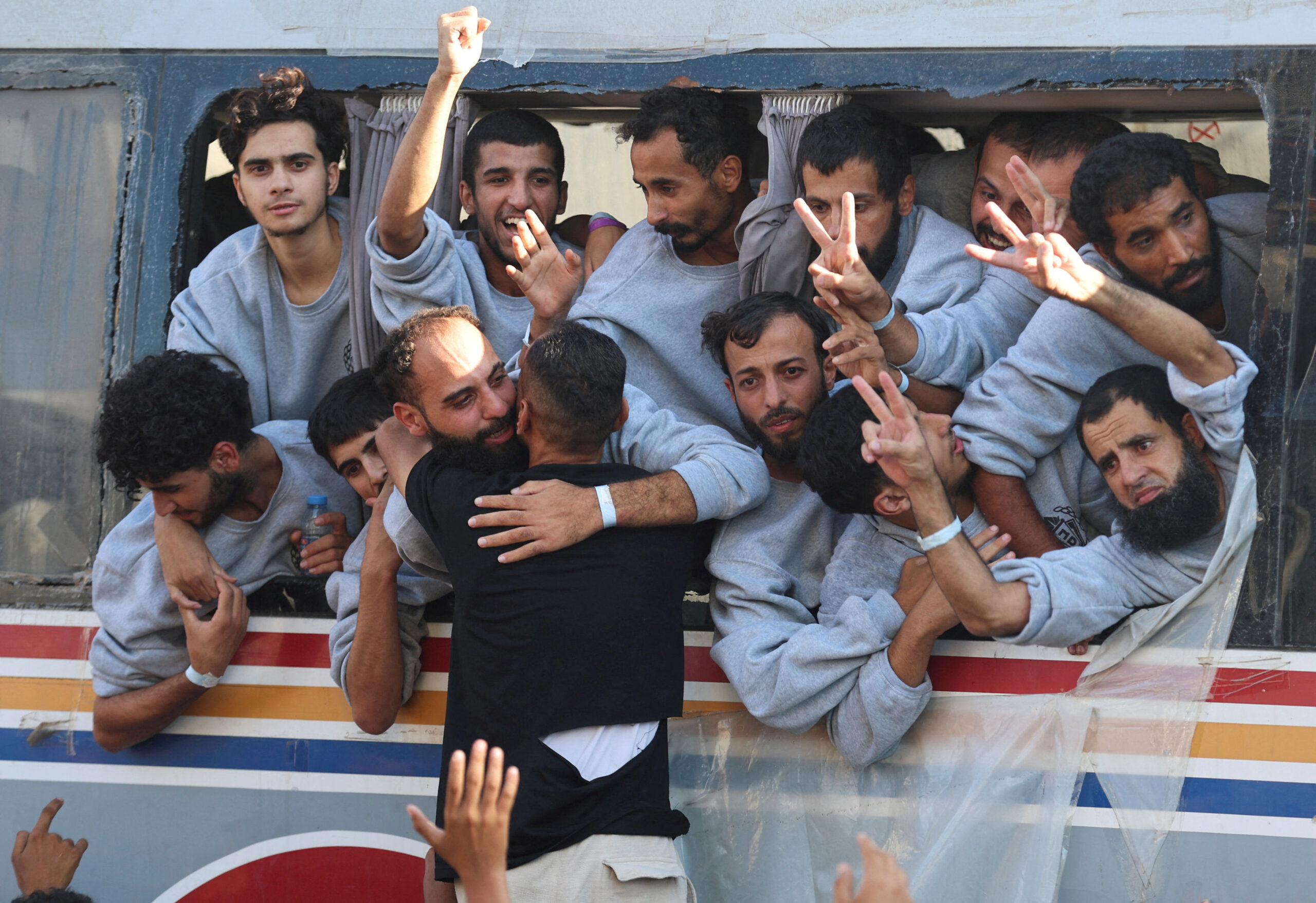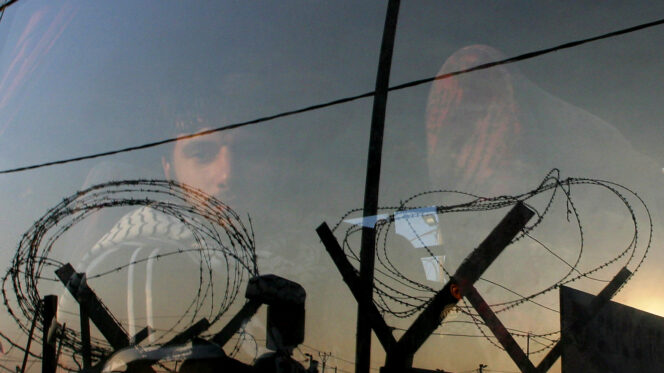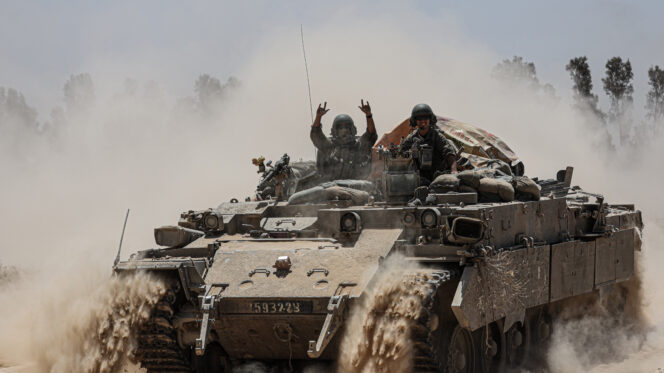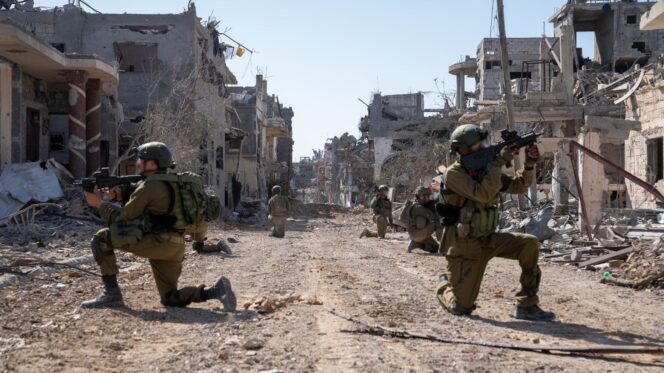Here’s What Happened When Israel Released 2,000 Palestinian Captives, Including My Uncle
The occupation stole him for seven months.
by Hassan Herzallah
20 October 2025

Thousands of us stood together, waiting for the moment the buses carrying the Palestinians released from Israel’s prisons finally arrived. In an instant, the air filled with chants of ‘Allahu Akbar’ and the sound of car horns, as tears mixed with laughter. Ululations rose to the sky, and the place trembled with a wave of joy and sorrow at once.
I saw thin bodies, pale faces and eyes searching through the crowd for their loved ones – for lives stolen by long years of absence.
On 13 October, following the announcement of the ceasefire that ended two years of war in Gaza, we witnessed an extraordinary event: the return of the released Palestinians.
We received news about a possible ceasefire in Gaza less than a week earlier. This was not the first time we had heard such news, only to find at the last moment that it was false hope.
None of us truly believed it, except for my aunt who lived next to us in the camp. She knew that her husband, my uncle Abu Yusuf who had been taken by the occupation in mid-March, might be among the released Palestinians in any potential deal. This hope kept her holding onto a fragile thread of optimism despite the despair around us.
We were all in Rafah, southern Gaza, when Israeli tanks suddenly entered the area. My family and I had to flee under constant shelling, with tanks no more than half a kilometer away. We left behind everything we owned – the items we’d previously managed to salvage from our home that had been destroyed in the war.
As for my aunt’s family, they were unable to leave as their area in Tel al-Sultan was completely surrounded. The Israeli occupation imposed a tight blockade on the neighbourhood, preventing civilians from moving freely. They arrested men in large numbers. The detainees faced humiliation and arbitrary detention, and their families had no idea where they were. Among them was Abu Yusuf, my uncle who was taken without charge.
My aunt did not know how to manage her affairs during that period, so she came to stay with us on the same land where we were displaced. She endured hunger, shelling and fear after being left alone with her four children.
After contacting a humanitarian organisation, she learned that her husband was being held in an Israeli prison and that, in case of a ceasefire agreement, he would likely be released. Like thousands of other families whose members were taken, my aunt’s every moment had been filled with fear and despair.
On 13 October, I went with her to await the arrival of the released Palestinians at Nasser Hospital in Khan Younis. As we waited for the buses, her eyes were full of tears.
When the buses finally arrived, she saw Abu Yusuf through the window – but there were faces that families did not recognise, as their features had changed beyond recognition, bearing the marks of the suffering inflicted by Israeli prison guards.
My aunt embraced her husband, whose face had changed from the bitterness of captivity and the torture he endured. The hardest part was that for several months, he had believed while imprisoned that his entire family had been killed. Only in the last month was he informed that his family was safe.
Among the released Palestinians, there were detainees who discovered that some or all of their family members had been killed. One man left prison only to find that his entire family, including his children, had been martyred. All he could ask for was a photo to see their faces – even on a phone. He had been waiting for the moment of release to see his wife and children, and tell his wife about the meals he wanted her to prepare.
Another detainee had made a bracelet for his daughter, whose birthday was on 18 October. But upon leaving prison, he found no one to welcome him. All his family members had been killed. He fell into a state of shock and started screaming.
One young woman tried to ask about her husband who was believed to have been killed months earlier, yet she felt inside that he was still alive. She contacted one of the released Palestinians to reassure her, and was informed that her husband was still in the occupation’s prisons.
Israel released nearly 2,000 Palestinians on 13 October, including approximately 1,700 who had been held since the start of the war on Gaza without charge. On their first morning of freedom, they were confronted with the loss of loved ones and the destruction that had swept across Gaza. Their bodies bore the marks of exhaustion, injury and hunger. Some found themselves visiting the graves of their loved ones instead of their displacement homes.
Their freedom is a partial victory, telling stories of both pain and resilience. With every moment of joy, the shadow of war and captivity lingers.
Meanwhile, around 9,000 Palestinians still languish in Israeli prisons under conditions described as a humanitarian “hell” while their families wait for a glimmer of hope that may never come. The stories of these prisoners and the courage of their families stand as a living testament to the resilience of a people who continue to dream of life, dignity and peace.
Hassan Herzallah is a Palestinian writer and translator, based in Gaza.


